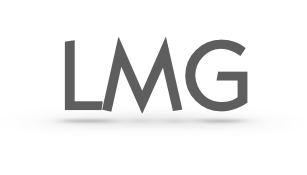Offshore leak exposes financial secrets
of Ghislaine Maxwell’s family
Leah McGrath Goodman
with BEN WIEDER, AND KEVIN G. HALL
Miami Herald
June 15, 2022
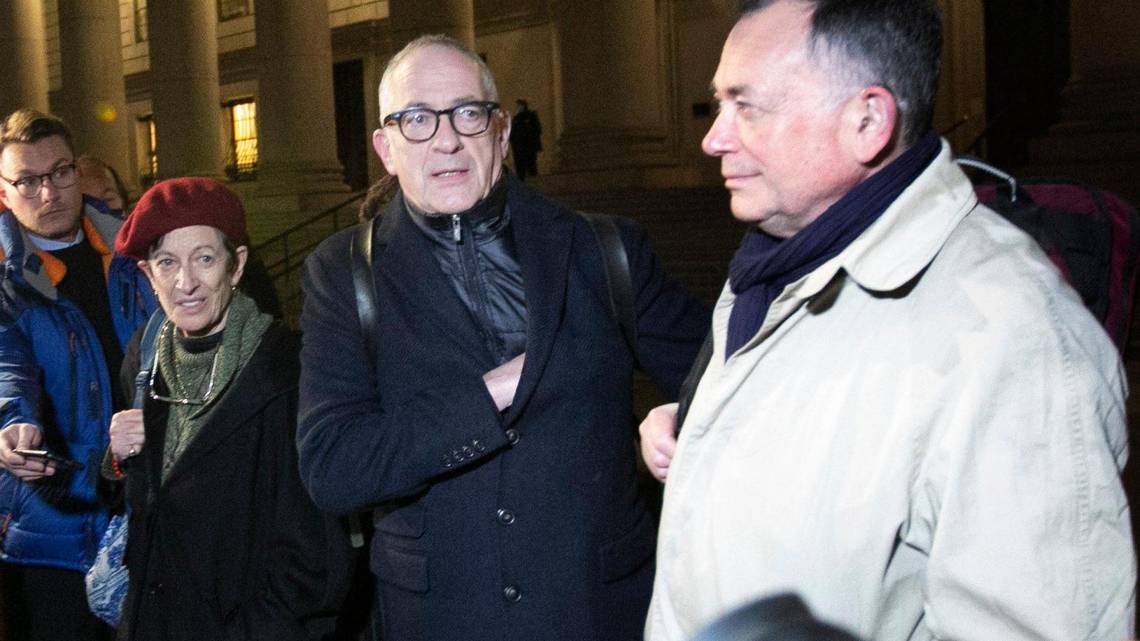
Photo by Emily Michot, Miami Herald
Isabel, Kevin and Ian Maxwell, siblings of Ghislaine Maxwell, leave the court after closing arguments concluded in their sister’s trial.
Jeffrey Epstein and Ghislaine Maxwell occupied the highest reaches of society, hobnobbing with royalty and world leaders while hopscotching the globe on Epstein’s private jets.
Maxwell’s sex-trafficking trial last December, which resulted in her conviction on five of six counts, showed how the pair used their money, power and vast global connections to recruit, groom and sexually abuse girls across multiple continents.
But the full scope of how they built their wealth remains a mystery. Epstein’s death in federal custody in August 2019 may have closed the door on a complete accounting of his riches — especially since the beneficiaries of his inheritance remain a secret — but Ghislaine Maxwell’s trial offered a glimpse into how she and Epstein operated, using offshore companies to build, disguise and conceal their wealth.
Maxwell’s family has long been dogged by scandal since the mysterious 1991 drowning of Ghislaine’s father, British media mogul Robert Maxwell, who was subsequently accused of stealing more than $1 billion from his own companies and their pension funds. For decades after his death, questions lingered over where the money went. While Ghislaine may be the first of her infamous family to be convicted as a criminal, hers is just the latest flashpoint in a long list of troubling legal and financial conflicts involving her family and siblings.

Photo Courtesy of Darrin Stock
A photograph of St. John’s Manor, the 58-acre estate where the La Hougue records were stockpiled.
A new joint investigation by the Organized Crime and Corruption Reporting Project and the Miami Herald examines secret offshore trust documents that reveal how Maxwell family members and their longtime associates occupied a parallel financial universe while keeping their wealth beyond the reach of creditors and legal adversaries.
The investigation, based on documents from the island of Jersey, a
U.K. Crown tax haven located in the English Channel, shows evidence of highly irregular trading activities in publicly listed U.S. companies, secret stock deals, and possible securities violations, while millions of dollars in payments moved through offshore companies to members of the Maxwell family. These transactions, some of which may have hurt public investors, have never before been reported.
The documents are part of a much larger trove of files from a now- defunct trust called La Hougue that was based on the island of Jersey.
The massive find — 350,000 pages in all — was unearthed in 2012 in a locked, indoor squash court at St. John’s Manor, a sprawling, 58- acre estate, by Tanya Dick-Stock and her husband, Darrin Stock.
Tanya’s father, John Dick, a Canadian lawyer who was listed in a document found in the trust’s files as La Hougue’s beneficial owner, lived in the Jersey manor where La Hougue was headquartered.
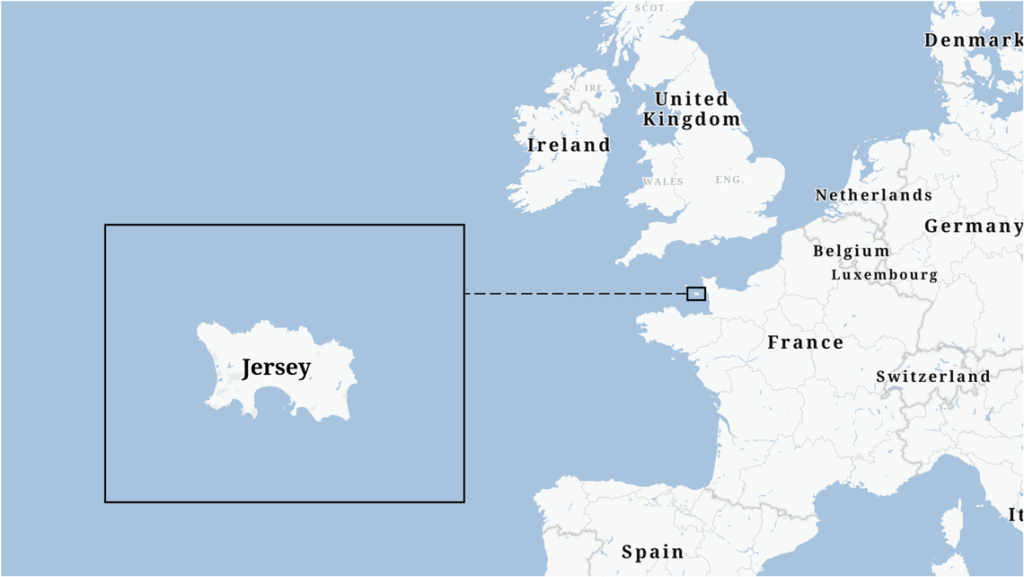
Jersey locator map Court Cox
OCCRP and the Miami Herald have also learned a whistleblower complaint was filed late last year with the U.S. Securities and Exchange Commission, alleging numerous securities violations and fraud by Kevin Maxwell and La Hougue. The SEC would not comment on the filing, and a Freedom of Information Act request filed by the Herald and OCCRP gave no indication that an investigation is currently underway.
Ghislaine’s father, Robert Maxwell, was a larger-than-life media baron and would-be rival of Rupert Murdoch, whose holdings included Britain’s second-largest newspaper, the Daily Mirror; the New York Daily News; and New York publisher Macmillan. He often boasted of advising U.S., UK, Russian and Israeli leaders on intelligence matters and foreign policy. His body was found off the Canary Islands after he disappeared from his yacht, which he dubbed the Lady Ghislaine.
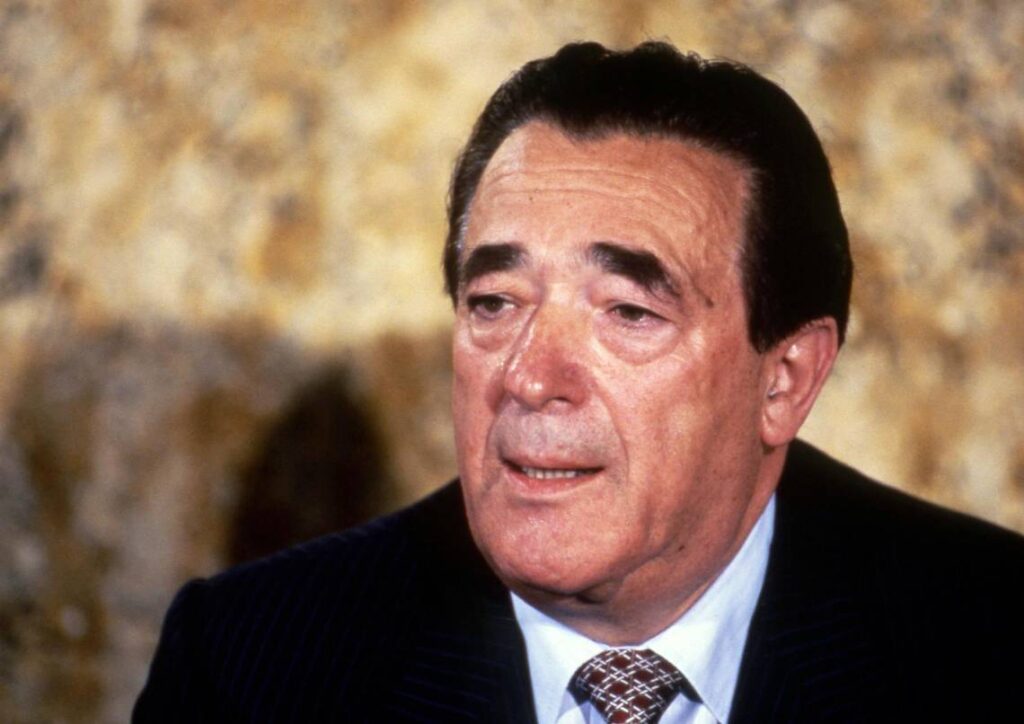
British publishing magnate Robert Maxwell speaking in 1984. AP
“These all have obvious, super-well-known badges of fraud,” said William K. Black, a law professor at the University of Missouri Kansas City and former federal bank regulator who reviewed the documents. He pointed to signs of potential tax evasion and fraud through transactions involving stocks from publicly traded companies and warned the involvement of multiple family members in the transactions was a red flag.
Reached by the Miami Herald and OCCRP, Ian Maxwell sent an emailed statement. “Neither I nor my brother, Kevin, to whom I have spoken, have any unaided recollection of a company called La Hougue and certainly were not involved as investors, shareholders, directors, agents or representatives of that company.”
Ian declined to answer a detailed list of questions or comment on La Hougue documents signed by both brothers. A representative for the family declined to provide further comment from Ghislaine Maxwell or any other family members.
STARTING UP, CASHING IN
Far from occurring solely offshore, the Maxwell brothers’ activities crossed over into the buying and selling of publicly traded U.S. companies, according to the La Hougue documents, including companies that they and their associates traded in secret.
The Maxwells’ most successful public company appears to have been a telecommunications concern based in the British Virgin Islands and Delaware called Telemonde, co-founded by Kevin Maxwell.
Telemonde opened sumptuous offices on New York’s Park Avenue and in London’s Portman Square.
The files show how, starting in late 1998, when Telemonde first went public on the Nasdaq startup network called the “over-the-counter” market, entities controlled by the Maxwells or their agents secretly sold millions of dollars worth of shares through La Hougue.
Kevin Maxwell, Telemonde’s chairman, reportedly held a 7% stake when the company went public. But because the Maxwells often failed to report their trades to U.S. regulators on time — or at all — it is impossible, to this day, to ascertain just how much Telemonde stock the Maxwell brothers actually owned, controlled, or sold.
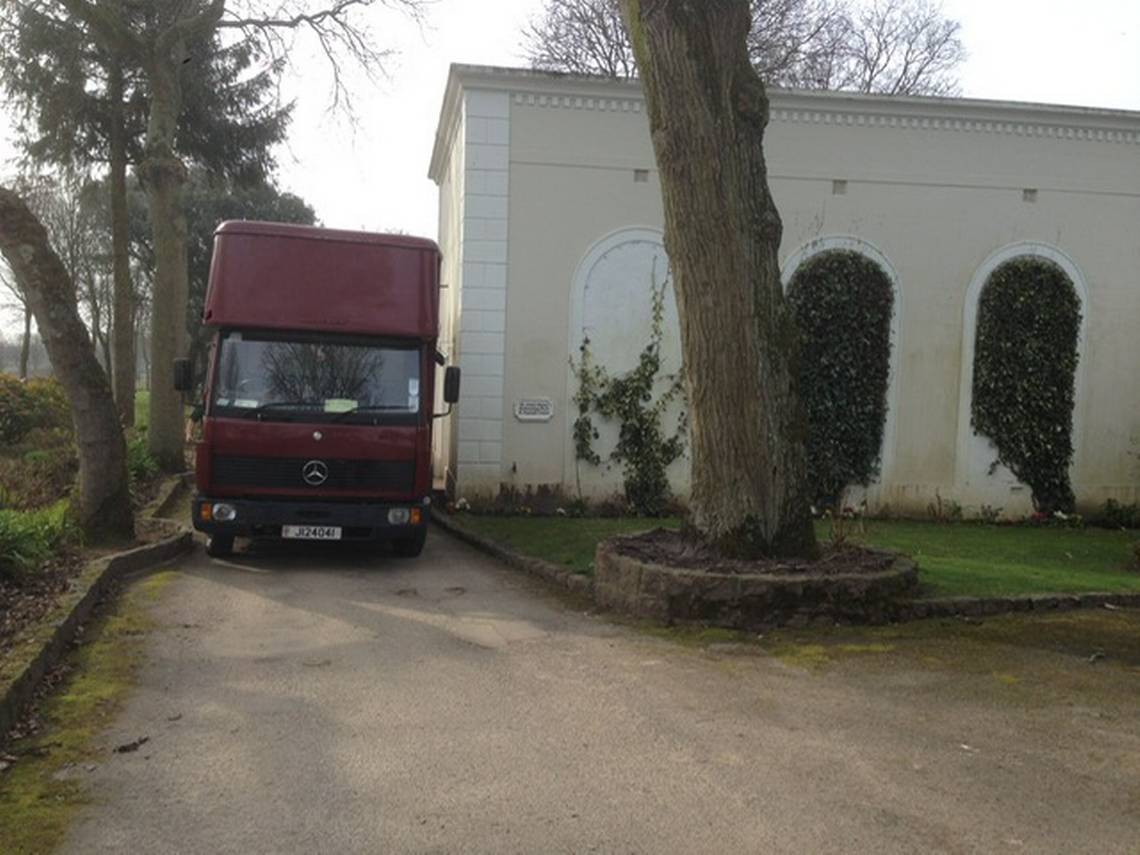
Courtesy of Darrin Stock
A police truck is parked next to the squash court where the La Hougue records were stored.
When the SEC ultimately revoked Telemonde’s registration in 2005, it cited the company’s “egregious” failure to file required public reports that “deprived the investing public of current and accurate financial information on which to make informed decisions.” The SEC added that “many publicly traded companies that fail to file on a timely basis are ‘shell companies’ and, as such, attractive vehicles for fraudulent stock manipulation schemes.”
UK investigations in the wake of Robert Maxwell’s death revealed that he formed mazes of shell companies while gambling company funds in the stock and foreign exchange markets as he fought to keep his empire afloat.
During the years Telemonde traded before its collapse, its value leapt into the hundreds of millions, spurring furious sales by the Maxwell brothers, who stashed the proceeds in offshore accounts in Jersey.
Between June 23rd and 29th of 1999, for example, the La Hougue documents show sales of 208,000 Telemonde shares, fetching nearly $1.4 million at an average price of $6.72 a share. “The shares never regained those highs, falling below $1 to trade at pennies by March 2000, as the company foundered.
Funds in the Maxwells’ accounts are frequently represented as “loans” or the repayment of debt. This may have been another deception: Loans often appear in the files where funds or shares are being transferred. Because loans are not taxable and profits are, it is possible the funds were simply labeled as loans to avoid paying taxes. (Creating bogus debt where there is none is a prevalent pattern in the La Hougue files.)
Some loans went unpaid and at other times, the Maxwells’ accounts show ballooning negative balances skyrocketing for months, at a time when media reports showed that Kevin Maxwell was trying to dodge creditors.
“It is not normal for accounts at any financial institution, anywhere, to be allowed to run into debt like that for months or years at a time,” said Danny F. Dukes, a former bank executive and forensic accountant who reviewed the files.
The Maxwell files include documents indicating where funds are going and to whom. The size of the payments often appear designed to fly under the radar, but are numerous. For instance, in a series of stock sales and other transactions from July 1999 to July 2000, the files show an account labeled “Loan 1,” with approximately $1.2 million in it, sending payments to and from trusts, bank accounts and entities around the world, naming Maxwell family members as recipients.
They include
- $30,354 to Christine Maxwell’s husband, American astrophysicist Roger Malina
- $41,600 to an account at the investment bank Piper Jaffray in Minneapolis directly referencing Kevin Maxwell; $155,800 to a Swiss account with the reference “Westbourne,” the same name as Westbourne Communications Ltd., which, at times, employed both Kevin and Ian. The company also received $452,450 from Telemonde for “certain consulting services,” according to an SEC filing.
- The late Robert Maxwell’s wife Elisabeth “Betty” Maxwell (who died in 2013), along with his daughter, Isabel Maxwell, and Ian Maxwell’s then-wife, Tara Maxwell, also acquired a combined 810,500 shares in 2000, according to another SEC filing submitted in 2001. In violation of SEC rules, that filing was made late, more than a year after the family acquired the stock.
The Maxwell family members purchased the shares at one- thousandth of a cent each, between March and May of 2000. By that time, Telemonde had fallen from its 1999 highs near $7 a share, but still frequently traded above $1, which means Maxwell family members received the shares almost for free.
Family ties to La Hougue appear to trace back to at least early 1997, the year after the Maxwell brothers were acquitted, with a letter from Kevin referencing a payment to the trust from his then-wife, Pandora Maxwell.
Kevin Maxwell also drew a $396,000 salary from Telemonde, which retained and bought multiple companies associated with the Maxwell family. One of these was EquiTel Communications Ltd., where Kevin was a director and beneficial owner. According to a late 1999 SEC filing, the acquisition of Equitel, which shared offices with Telemonde, would entitle Kevin to additional Telemonde shares worth up to $5.95 million. Equitel’s managing director, Larry Trachtenberg, was an adviser to Robert Maxwell and was acquitted of criminal conspiracy and fraud charges alongside Kevin and Ian in 1996.
The La Hougue files show the Maxwell brothers also engaged in unreported trades of another U.S. publicly traded company called NetJ.com, which appears to have links to one of their lawyers. The company’s shares spiked before flaming out, and the Maxwell brothers cashed in again on the highs. Unlike Telemonde, however, the brothers’ association with NetJ was never publicly known, even as they appear to have traded in hundreds of thousands of shares. It is only through the La Hougue files that their trades can be traced.
NetJ’s market activity cast such an unusual profile on Wall Street it caught the eye of author and financial journalist Michael Lewis, who poked fun at the company in an article in the Observer in 2000.
Lewis noted that while NetJ was worth $22.9 million and its shares were trading at $3.50 each at the time, it had stated in an SEC filing that “the company is not currently engaged in any substantial business activity and has no plans to engage in any such activity in the foreseeable future.” In other words, Lewis wrote, “we do nothing and we intend to continue to do nothing.”
‘LAYERED SHAMS’
The Maxwell files contain notes scribbled by a La Hougue agent on the margins of one of files warning not to allocate 5% or more of outstanding shares in a company to any single shareholder, lest it trigger a mandatory SEC report.
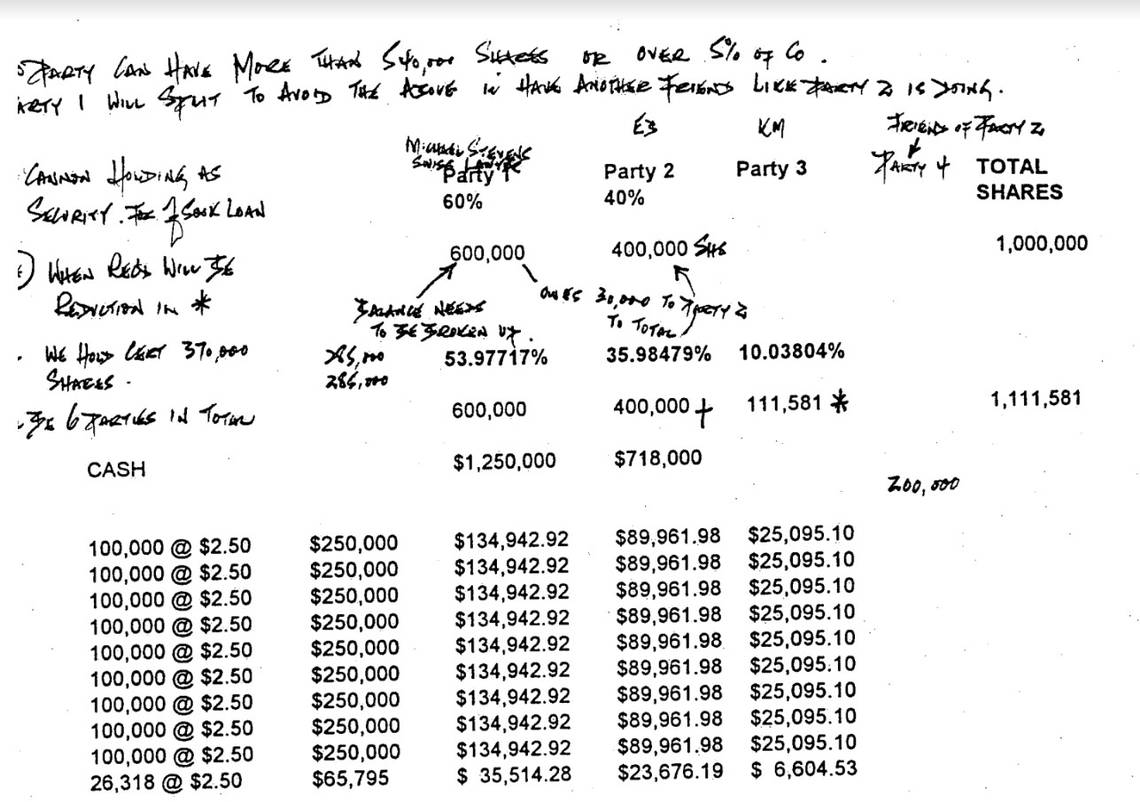
La Hougue document with scribbled note indicating that allocation of too many shares would trigger disclosure requirement.
“The 5 percent rule comes up a lot in stock manipulation,” said Dukes, the forensic accountant. He called it the “hallmark” of U.S. stock fraud schemes.
While these activities are likely beyond the statute of limitations to bring charges, the files show how members of the Maxwell family appear to have outfoxed the regulators and authorities investigating them — on both sides of the pond — for years.
Frank Casey, a Wall Street risk manager who examined the Maxwell files in detail at Darrin Stock’s request, said the transactions detailed in the files struck him as misleading. “When you look at these documents, a lot of these companies seem like layered shams,” said Casey, who was on the team that first attempted to blow the whistle on Bernie Madoff’s Ponzi scheme (missed for years by the SEC).
Casey believes these files may hold the key to the disappearance of funds from a range of Maxwell entities after Robert Maxwell died. “Who knows, perhaps La Hougue is the missing link to the Mirror pension scheme fiasco,” he said.
Many of the La Hougue files have yet to be fully decoded and analyzed, as its top clients are rarely named and listed only as numbers to avoid exposing them. Ghislaine and Robert Maxwell are not directly named in the files, nor is Jeffrey Epstein, although it seems he may have had associates on the island.
Dick, the beneficial owner who is now a director at Liberty Global, the parent company of Virgin Media, denies any wrongdoing, and points the blame at Richard Wigley, a former chairman of the company who Dick said had engaged in “criminal transactions” of which he was not aware. “A lot of what he did I had very little knowledge of,” Dick said. “I found out that what he was doing was not on the up and up. It created a lot of problems.” Dick said he had heard the Maxwell family had done some work with Wigley, but wasn’t aware they were in the trust’s files.
Wigley couldn’t be reached for comment, but said in a 2015 Denver deposition that Dick had control of La Hougue. “He owned it. He didn’t own it in his own name, like everything else, but he owned the large percentage, if not all of it,” Wigley said.
Wigley was sanctioned in 2016 by a U.S. court for committing perjury and admitted to fabricating documents and more than $15 million of loan notes for La Hougue. In 2018, a court in Jersey noted in a judgment that Wigley had admitted to “making untrue statements in these proceedings” and manufactured letters, promissory notes and minutes filed as evidence to the court.”
‘RECKLESS’ CONDUCT
The patterns of hide-and-seek in the La Hougue documents were also echoed in the affairs of Ghislaine Maxwell, who similarly used offshore companies and trusts. Her opaque finances were a major sticking point ahead of her 2021 trial and one of the reasons she was denied bail four times by U.S. District Judge Alison Nathan, who complained that she couldn’t get “a clear picture of Ms. Maxwell’s finances and the resources available to her.”
Ghislaine first told federal authorities her assets were worth around
$3.8 million, but a financial-condition report submitted later on her behalf by UK accounting firm Macalvins disclosed that she and Scott Borgerson, reportedly her husband, had a shared net worth of about $22.5 million, split between U.S and foreign bank accounts and more than a dozen LLCs. The report also stated that she had “transferred the majority of her assets into a trust controlled by her spouse” in 2016, the same year she and Borgerson reportedly married.
Before her arrest, Ghislaine’s financial conditions were even murkier. She was arrested on a 156-acre New Hampshire estate that had been purchased in December 2019 through a shell company. Ghislaine toured the property under a pseudonym and her name didn’t appear anywhere on the purchase documents, according to someone with direct knowledge of the sale.
That same year, prosecutors said, Ghislaine had reported her net worth as $10 million when she opened a Swiss bank account. And during her trial, prosecutors revealed how offshore companies and trusts belonging to Jeffrey Epstein transferred tens of millions of dollars in cash and assets to Maxwell as recently as 2013, even though her romantic relationship with him purportedly ended more than a decade earlier.
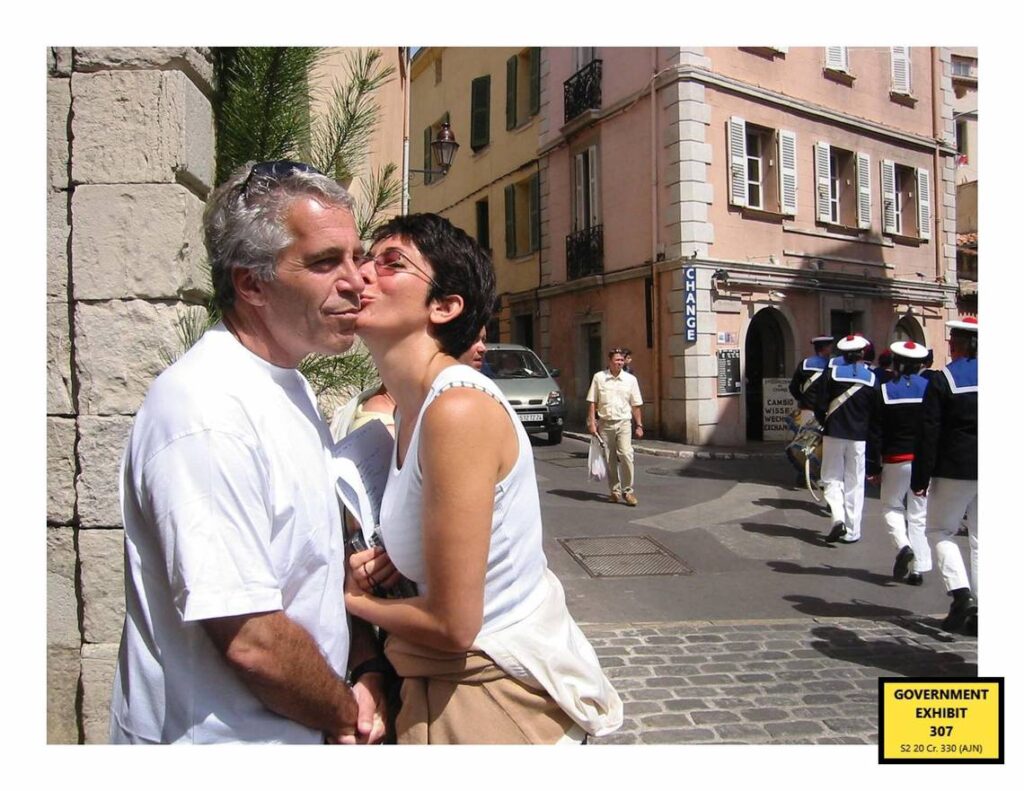
Prosecutors in the case against Ghislaine Maxwell released an array of photos of Jeffrey Epstein and Maxwell, underscoring their close relationship.
Prosecutors in the case against Ghislaine Maxwell released an array of photos of Jeffrey Epstein and Maxwell, underscoring their close relationship.
Ghislaine’s use of shell companies and her shifting declarations about her true net worth may follow the Maxwell family pattern for good reason. Her finances, like her father’s and her brothers — Kevin and Ian — have frequently been tied to one man: British solicitor Malcolm Grumbridge, who was fined and agreed to leave the legal profession in December 2020 after reaching a settlement with U.K.’s Solicitors Regulation Authority in which he admitted to years of “reckless” conduct. Grumbridge also appeared in Epstein’s black book of contacts.
In an interview with the Herald and OCCRP, Grumbridge stated that he met Epstein once, but never worked for him. Grumbridge said he worked for Robert Maxwell starting in 1976, the year Grumbridge entered the legal profession, until Maxwell’s death, and continued to handle financial and property affairs for the Maxwell brothers and Ghislaine Maxwell until 2020. He declined to discuss business specifics, citing client confidentiality.
Grumbridge is named repeatedly in the Jersey files as representing the activities of Kevin and Ian Maxwell and helped in setting up and overseeing companies on behalf of the brothers. Grumbridge said he never worked for La Hougue directly and never had contact with its owner, John Dick.
Grumbridge, along with La Hougue agent George Devlin, facilitated many of the Maxwells’ stock transactions that ran through the trust from 1999 to at least 2001. (Devlin, now deceased, was a well-known British private investigator and legal consultant involved in defending a member of the “Guinness Four,” a major 1980s stock- manipulation scandal in the UK.)
While Ian Maxwell said he did not recall La Hougue, he added, “We did have dealings with the late George Devlin, mainly involving loans, but have no recollection of specific details.” He would not comment further on the nature of the loans, but Grumbridge described a process by which stocks of companies would be posted as collateral in exchange for the loans. He declined to explain the purpose of the loans or whether it might be a method for profiting off private shares sales, while avoiding tax, citing client privilege and confidentiality. Some loans went unpaid and, in multiple correspondences, Devlin can be seen chasing the Maxwells to repay debt, as well as threatening bankruptcy proceedings. Other times, the Maxwells’ accounts show large ballooning negative balances at the same time it appears Kevin Maxwell was trying to dodge creditors. “It is not normal for accounts at any financial institution, anywhere, to be allowed to run into debt like that for months or years at a time,” said Dukes, the forensic accountant.
Grumbridge also was connected to Ghislaine’s financial and property affairs ahead of her trial, including the London home where Ghislaine and Prince Andrew were photographed with Virginia Giuffre, who accused the prince of sexually assaulting her before they settled earlier this year for a reported $12 million. Ghislaine’s defense team planned to call Grumbridge to testify about that property, but Grumbridge said he was never contacted by Ghislaine’s lawyers and played no part in the trial.
Grumbridge declined to comment on the nature of his legal work for Ghislaine or other members of the Maxwell family, but confirmed he had relationships with partners at Macalvins, the accounting firm that compiled Ghislaine’s financial-condition report. Macalvins was tapped soon after Ghislaine’s arrest to document her wealth, according to the Times of London, because “it already had background knowledge of her finances.”
Even before the the expiration of Kevin’s eight-year ban from running companies in the UK, Grumbridge set up a real estate company for Kevin Maxwell in 2019..
In Grumbridge’s 2020 settlement, UK regulators specifically noted how he had acted for “two brothers simultaneously with one file and one client ledger,” without identifying the brothers. Asked whether Kevin and Ian were these brothers, Grumbridge said he could not discuss any regulatory matters, but said, “I do not know of any other brothers.”
While the extent of the Maxwell family’s byzantine financial world may never be fully exposed, when viewed alongside Ghislaine’s Maxwell’s finances in her sex-trafficking trial, the Maxwell papers show a decades-long modus operandi of financial deception.
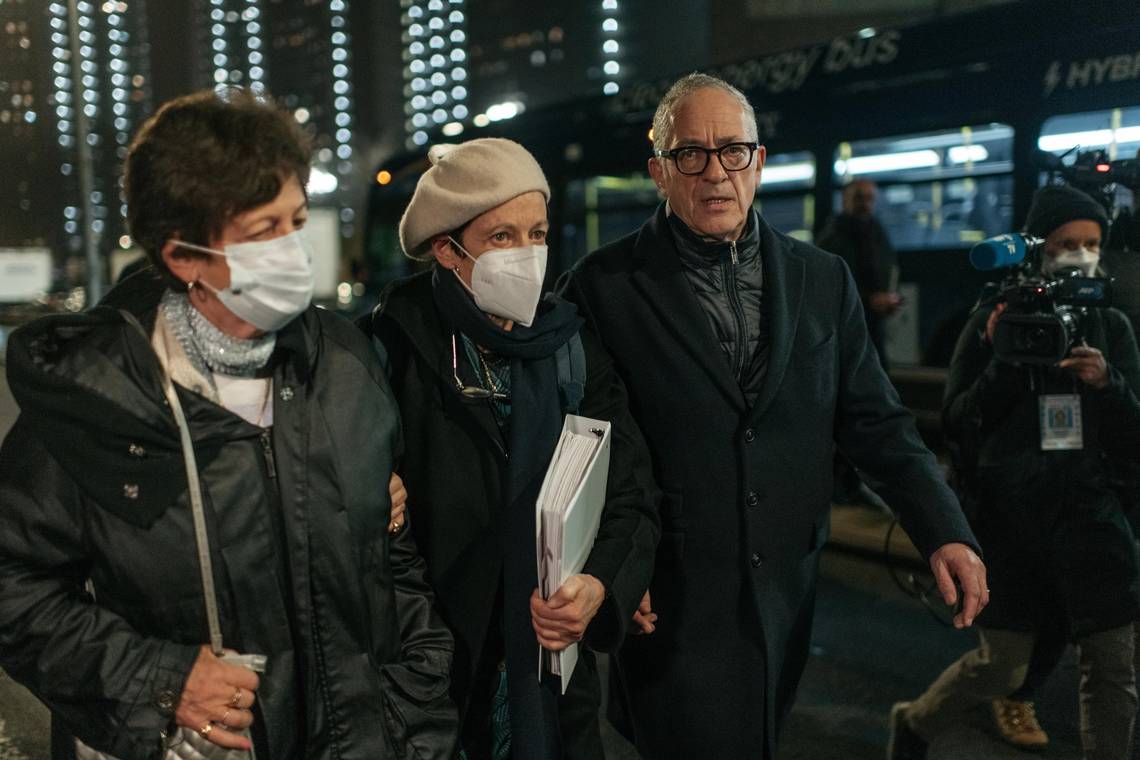
Photo by Scott Heins Getty Images
From left to right, Ghislaine Maxwell siblings Christine Maxwell, Isabel Maxwell, president emeritus of Cyren Ltd., and Kevin Maxwell leave federal court on Dec. 29, 2021, in New York City.
Ghislaine and her siblings came together one last time before she was convicted. In the days before her guilty verdict, her brothers, Kevin and Ian, along with her twin sisters, Isabel and Christine, linked arms outside the U.S. courthouse, in a public show of support for their youngest sister, before walking inside. A jury found Ghislaine guilty in December on five of six counts, including sexual trafficking of a minor. She is scheduled to be sentenced June 28, facing the possibility of spending the rest of her life in prison. The La Hougue files were first reported on by New Zealand investigative journalist Nicky Hager, who generously shared them for this story.
